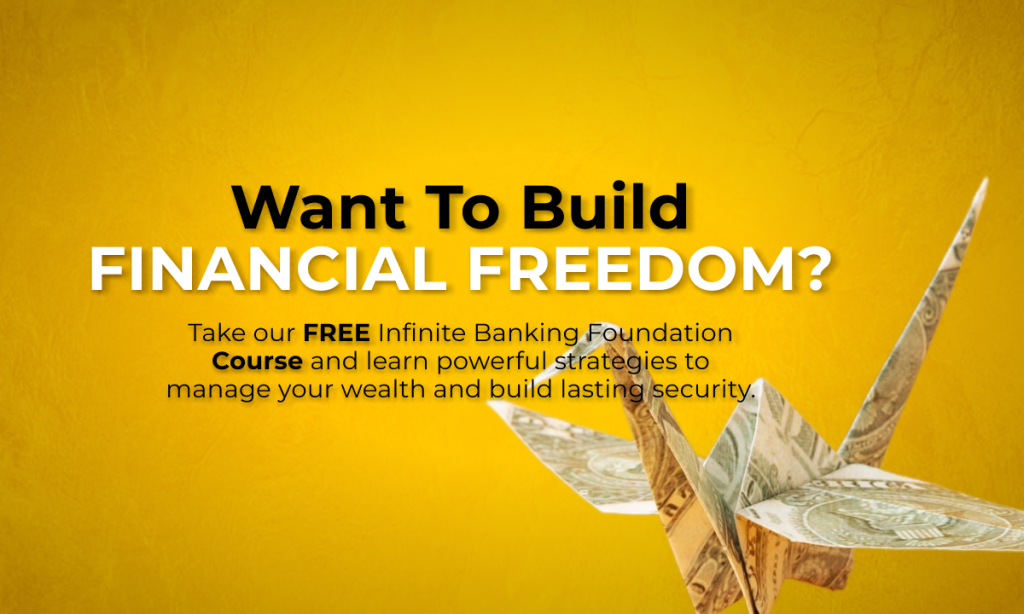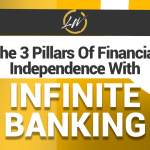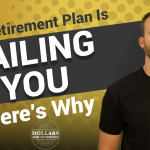In this episode, Nate Scott explores the three critical pillars of financial independence—income, security, and control—and reveals how Infinite Banking offers a unique pathway to achieve these goals. Drawing from personal experience, Nate illustrates how Infinite Banking serves as a cornerstone for building passive income streams, ensuring financial security, and retaining control over one’s financial destiny. He invites listeners to embrace Infinite Banking as a powerful tool for transforming their financial future and attaining lasting independence.
Ready to break free from the traditional financial system and become financially independent through infinite banking? Schedule your FREE consultation now!
Key Takeaways:
- The Quest for Financial Independence: Financial independence is the ultimate goal for many, but traditional financial strategies often fall short of achieving true independence.
- The Three Pillars of Financial Independence: Income, security, and control are the three essential pillars for achieving financial independence. Without balance across all three, you can’t achieve true independence.
- The Role of Infinite Banking: Infinite Banking offers a unique approach to financial freedom, providing a foundation for building passive income streams, ensuring financial security, and retaining control over one’s financial future.
- The Value of Infinite Banking: The true value of Infinite Banking is not only in the policies themselves but in the way you can leverage them to achieve financial freedom.
Episode Resources:
Gain FREE access to our Infinite Banking Course here
——————————————————————————————————————————

LIVING WEALTH PODCAST
DOLLARS AND NONSENSE: EPISODE 239 TRANSCRIPTION
[00:00] Nate Scott:
The ultimate financial goal for most people is what I call financial independence. The problem though is that most financial strategies are not built to make you financially independent. If anything, they do a better job keeping you locked up.
So in this episode I discussed the three pillars of financial independence and also how infinite banking is uniquely positioned to help you achieve true financial freedom. I’m Nate. I make sense out of money. This is Dollars and Nonsense. If you follow the herd, you will be slaughtered.
All right, everybody. Welcome back. It’s so awesome to have you here. We’re going to talk about something that I think should really hold dear to everybody. And that’s the idea of financial independence, and whenever we discuss something like this, I really believe that financial independence is what everyone is really after.
It’s like the holy grail of financial strategy. If ever, and I think that there’s, I know the word sounds kind of fun, you know, financial independence sounds like a nice word, but at the end of the day, all financial planning is really built and designed to be a fun experience, or at least it should be.
[01:06] Nate Scott:
But for most of the time people get involved with, you know, financial planning, conventional retirement planning, and it doesn’t really help them achieve what they really want. So I’m going to dive in today on what I really believe financial independence looks like and hopefully you’ll see that.
If financial independence is what you want, certain things help you get there. Certain things don’t help you get there. So there’s three main pillars to financial independence, the way that I see it, and these three pillars are income, security, and control. They’re like the three legged stool.
They’re the three legs on the stool of financial independence, income, security, and control. And with those three, if you have one of them that’s out of balance, you can be very successful with the other two and still feel like you’re missing something. The other thing I would like to note on this front too, is financial independence. There are some objective things about being financially independent, but there’s also some subjective things.
[02:03] Nate Scott:
I think a lot of people would look at some, a lot of people in, and maybe in a poor position or a lower middle class position will look at someone who’s upper middle class and rich and assume that they feel financially independent. And then you go talk to those other people and they don’t feel financially independent at all.
For whatever reason, that’s because true financial independence, there is some objectivity to it. You can be objectively not financially independent. You could be in a slave situation practically, or you can be kind of more objectively financially independent, but there’s like this continuum really that goes into infinity on the independent side.
And so we are dealing in the world of feeling. And that’s why I say that whenever you have income, security and control as your three pillars, if one of them is off base, you can certainly feel like things are, things are out of whack. So here’s how this works. So whenever we talk about these three things, the income piece is pretty straightforward.
[02:58] Nate Scott:
If you want to become financially independent, it’s very hard to do that unless you start getting some sort of passive income stream developed. And that’s, I think, what a lot of people assume financial freedom is all about, financial independence, whatever you want to call it is, as long as your passive income is greater than your monthly expenses, suddenly you’re financially independent and you can do whatever you want.
You don’t have to work for money anymore whenever that occurs you’re financially independent, but I think it goes deeper than this. But it is certainly true that it’s hard to be– That you know what we’re going to define as financially independent unless you have some sort of passive income stream coming in from various sources.
That would be enough to fund your lifestyle. And we’ll talk about that more in just a minute. The second piece is financial security there. It is one of the big issues. If you seek only after the income side, but you don’t have a bucket of money that is secure, that can’t go down in value, that you can’t lose the money.
[04:00] Nate Scott:
That’s not like invested to produce some huge gain in a risky scenario. If you have nothing that fits the security side of your life, you may have enough income coming in passively to maybe pay for your lifestyle, but you won’t feel independent because all your money’s tied up over there.
There’s not a buffer zone. So if something happens to any of those income streams, suddenly you’re not financially independent. In fact, if you run into a financial bind, for some reason, you might have to sell some of your income producing investments to cover the cost of whatever this emergency is.
At that point, your income has been reduced and you don’t have a security blanket. So what I’m saying is if you can build all three of these things, which I’m going to get to control as well, you can feel robustly independent. That’s the whole point. The whole point is to build, to use a term I’ve used before in the podcast, the Antifragile Life.
[04:58] Nate Scott:
It’s very robust. It can take damage and still work for you. And so you need to have some sort of passive or more passive income coming in. You need to have some form of security. There’s gotta be some money. That’s not being invested at risk that can create a buffer for you if things go bad on one side, you’ll still be okay financially.
And then the last piece is control. And it is very hard to feel truly independent when you’re not in control. I mean, this is like an obvious statement to say that if you have no control over the outcome of your life, financially, it’s hard to feel truly independent unless you just happen to be extremely wealthy.
And even then If there’s no element of control in someone’s life, they can certainly feel, even if they have a lot of money, they will not feel independent. , they’ll feel very dependent. And that’s a scary place to be in a lot of ways. And so whenever I talk about control, , you know, financial control, what I really mean is, more on the lines of if you, so let’s say I invest money in something that is producing a return for me and is giving me some income.
[06:10] Nate Scott:
But I have no control over whether that thing ends up being successful or not. I will never truly feel financially independent. I don’t have, there’s too many levels between me and controlling it. So what I do is like, if I make a loan to somebody as an investment and it’s producing interest income to me, that’s great.
And I do that. I have loans to other businesses and investments of that variety that produce income and it’s awesome. I love it. But on the flip side, if you don’t build more streams of income coming in, that you have some control over. Like running Living Wealth and having a business that I’m actually controlling that can produce passive income as we grow the business.
That is a totally different thing than lending money to somebody else’s business. Cause they could just pay me off at some point and then suddenly my passive income stream gets reduced and, and I wasn’t ever in control of it. The same thing goes with just messing the stock market or something like that.
[07:04] Nate Scott:
You can build up a nice nest egg in the stock market and never feel like you’re actually in control of any of it because the money can go up and down. It has nothing to do with you. You’re not actively involved in managing the money. So I feel like there’s got to be, in the control side of financial independence, there has to be some things that you actually are in control of and that you’ve gotten good at to truly feel robustly financially independent.
If you don’t ever have that control piece down, you may have some income. You may have some security. But if the income piece is all in stuff that other people are controlling, you’ll always be a little bit worried the whole time.
And so I’m trying to help you create a world which is robustly financially independent. It’s okay to put money in various places, but at some point you’re going to want to have some level of control. And so if we look at those three things, Financial independence equals income, security and control.
[08:00] Nate Scott:
Then you really start to realize that most financial plans are not even really seeking that type of thing. And that’s because I believe the world at large is actually trying to make us become financially dependent on the institutions of banks and mutual funds, wall street, even insurance companies, they all really want us to be financially dependent on them.
So that we give them all of our money and leave it there. Let them control it and manage it and hopefully it works out for us, but they don’t really, it is just a simple truth in business that if you have customers, you really want them to be dependent on you. You wouldn’t want them to learn how to do the things that you’re doing.
You want them to be dependent so that you can continue to make money from them. And that’s just the way of life. That’s the way it works. And that’s okay to some degree. But what we’re saying is if you will live your whole life and you just get caught up in the herd mentality and do all the things everyone else is doing, you will unlikely, you know–
[09:03] Nate Scott:
What’s interesting is that if you talk about, let’s say producing passive income, retirement programs, 401(k)s, IRAs, mutual funds, these things are relatively notorious for not being the best income generators. So, if what you really need to become financially independent is an income stream that comes in passively, but all you have is money tied up in one bucket of mutual funds, let’s say, and so all you have is this money in mutual funds.
The only way to turn that bucket of money into producing you an income would be to start selling your shares in the mutual fund, or selling the stocks in the brokerage account. That’s not exactly a true income source. That’s a liquidation event. And you’re hoping that over time, the appreciation inside of the portfolio will offset the distributions that you’re making so that you won’t run out of money along the way, but you don’t have any feeling of control over that.
[09:54] Nate Scott:
So it’s not, it’s not producing what we call true income. So a true income generating thing would be something like bonds, something like real estate, something like business, even like policy cash values and things like that. Things that are producing income that you don’t have to sell or liquidate in order to receive it.
Those things can push out income in perpetuity. It can cause to produce income. And so those are the things that would, if you really want income and that’s part of financial independence, then what’s the best way to do that? You know, a million dollar stock portfolio often will produce far different amounts of income than a million dollar real estate portfolio and so forth.
And then compare that to a million dollars of private equity in a business that you own or something like that. And you’ll notice that these things produce different amounts of income. And so, the typical financial planning does not really produce a ton of true income in a place that has a big buffer of security in an area that you can control.
[10:58] Nate Scott:
So for the most part, you don’t really ever get to the point of what, at least psychologically, you’ll never really get to the point of true financial, what we call what I call independence, which is really what I’m after. For the most part is this position of life where you get to decide every day what you want to do as opposed to what you have to do.
I’m also not a big believer in the idea of quote unquote retirement, but that’s why I say instead of your goal being to retire one day, I feel like your goal should be to become financially independent, be successful with what God has given you, regarding resources, put it to work in the right way and become financially independent.
Independent from the world where you don’t have to rely on banks to provide you funding all the time. You don’t have to rely on the stock market going up to feel okay.
[12:17] Nate Scott:
And every time, and in other words, just going through the rollercoaster of money. So with this being said, what I believe about what we do at Living Wealth and what I help clients do all day, everyday is implement the infinite banking concept and in that inside of Infinite Banking, I really believe lies the foundation to true financial independence.
I think whole life insurance policies when built for Infinite Banking become the perfect foundation to build a life that is financially independent. And this is super interesting to me. By the way, one thing I wanted to mention in this podcast episode was that the real value, by the way, of Infinite Banking, for those of you who’ve been learning about it, is not the life insurance policy itself.
The real value of infinite banking is how your life will look different in the future because you decided to get the policy started. Like this is what’s interesting about, you know, being in this world, in which case infinite banking, I’ve called it the gateway drug to financial independence, to financial freedom.
[13:23] Nate Scott:
For most people, the policy itself does not produce value. I mean, I do like what the whole life insurance policy offers just inside of itself, regardless of what we do with it. But at the end of the day, what infinite banking is truly about is how to recreate your life in a way that you can achieve financial independence.
Typically in a much shorter time frame than if you went down the conventional route, it becomes the hub for, you know, of the things you’re going to do to become truly financially independent. And so, in my own life, this is kind of how it’s worked. I got started with infinite banking in 2012 when I joined Ray, who is the founder of our company, passed away last year.
But when I joined Ray in 2012 as an intern, really his first ever true intern, something that story is kind of funny to tell. I’m not going to do it right now, but whenever I joined Ray and I started learning about infinite banking, of course I got my first policy. I got into the business. I even dropped out of college to join Ray full time.
[14:29] Nate Scott:
And it wasn’t even that I didn’t like college. It wasn’t that I was, I mean, I was a 4.0 student. I was actually having a blast. But when Ray said, Hey, Nate, I think you can learn more by coming on board with me full time and building this business than you would just going to get a finance degree, which is what I was doing at university and I agreed with him.
So I jumped in wholeheartedly. That was 2012, 2013, when I jumped in and I started to become a true infinite banking expert under his mentorship, meeting with clients, but doing it myself as well. But during that period of time, I was really– Of those three pillars of financial independence, income, security, and control.
I am more of a conservative person. And so what I was really after was financial security and financial control. Those were the super important things to me. And the income piece, I always felt, Hey, once I get this base built up of policies, I can always go out and find opportunities to put this to work to generate income.
[15:32] Nate Scott:
But right now, I don’t need the income. I don’t really want the income right this second. I’m going to focus on building my banking system inside of these policies. So, as my income went up, as I progressed in my career here at Living Wealth and as, you know, helping more and more clients, as my income went up, my premiums started to go up too.
And I went from, my first policy was like this little 5,000 premium policy to opening, you know, 12 policies since then and paying multi hundreds of thousands of dollars a year in premiums. And as this has occurred, I was looking for opportunities to put money to work, but I wasn’t hyper focused on it.
I was more hyper focused on building my business. And I would just kind of have my ear to the ground a little bit on investment opportunities. At some point along the way, a few years back, I really felt like I was in a perfect position right now with my three pillared financially independent stool here with the three legs that are propping up the stool, the security and control piece.
[16:31] Nate Scott:
I felt extremely secure and extremely in control. I mean, I had a large amount of, you know, seven figure amounts of cash value liquid to me that was all growing with no risk. I felt like I was in control. I didn’t ever have to go back to the bank to get a loan ever again, there was no volatility. I was really set and I was like, now it’s time to start focusing on income. And it really was like flipping a switch.
There were a few deals that came my way, a business that we started, getting into Airbnb, getting into some other, you know, people, some of my clients businesses as well as a more of a passive investor, lending money and things of that sort to where in the matter of having almost no passive income outside of the policy growth for 10 years to in a couple of years, generating enough income really across multiple investments to produce practical financial independence.
That’s kind of my personal testimony. It was the infinite banking piece of the puzzle that was the foundation where I pulled capital from to go achieve what I was really after to fill up that last piece.
[17:41] Nate Scott:
So now the policies themselves are offering me this big bucket of money that I find to have some security in that’s my non volatile piece of the pie where I have a big chunk of cash value that serves as my buffer. I also feel like I’m very much in control because I’m choosing, in a diversified way, different investments to produce passive income, some of which I have more control over, some of which I don’t, as I already talked about, by the way.
You know, if you lend money to somebody else’s business, you can get a return for that produce income, but you’re not exactly in control of the outcome totally, of course, in that, in that environment. So the goal is to have a bit of both to have, you want to get at least some that are under your control, some that you can, you know, certainly invest with other people, , to be able to produce income.
And suddenly what I’m– all I’m trying to bring up is that, and our clients would say the same thing, especially the ones that really tried to implement is that you can achieve a lot through this platform. I know that there’s other platforms out there, other systems to achieve “financial independence”.
[18:44] Nate Scott:
But if you commit to doing the infinite banking concept, you commit to funding policies at a high level, storing up capital that nobody could ever take away from you, that’s guaranteed to increase every single year. And then you will start to cover the pieces of financial security and financial control that I feel like are missing And most financial strategies and you can then use the policies borrowing against them to fund different investments that can produce income.
And suddenly you’re going to feel very much financially independent, I would say if the normal retirement planning route is like a 40 year build out for most people and using 401(k)s and IRAs and mutual funds, starting in your twenties and going into your sixties. It’s like, that’s the normal game plan.
You’re not going to get rich overnight from transitioning out of that into just opening a life insurance policy as if that’s your ticket to financial independence all by itself. But what I am saying is instead of having 40 years of just saving money in the conventional way, if you transition to saving money through your infinite banking policies.
[19:57] Nate Scott:
You’re going to feel financially independent. It’s like the first step towards financial independence. You’re going to start feeling more in control. Cause you’re, cause you’ll have more control. , whenever you have the policy. You’re going to feel more secure. Because you know that the policy itself is going to only ever go up.
It’s never going to go down. And then you can leverage the policy to go achieve other things. Like generating more income, making loans. You can make loans to your own family members to produce income. You can make different investments. And suddenly what you thought might take 20 years, 30 years, 40 years, you can shrink that down to 10 years or less when doing infinite banking the right way.
As I said, the real value of infinite banking is not the policy by itself. The real value is how your life will look differently in the future because you have your infinite banking policies, your system of policy set up life looks different down the road.
[20:50] Nate Scott:
So I really do believe that the ultimate financial goal for everyone is to become financially independent. In order to achieve that, you’re going to need to have passive income coming in. You’re going to need to have financial security through some sort of a pot of money that is buffering you from volatility, which of course I believe whole life insurance policies fit the bill better than anything else.
And then lastly you’re going to have to have some sort of financial control over outcomes and some of this can be you know just psychologically some of this can be over in your own life practically like if you’re out of control spending wise, it might be difficult to become financially independent. So there are some control mechanisms that need to be in place.
But one of them is really if all of your assets and investments results are completely out of your control it will be very difficult to truly feel financially independent. There’s always going to be psychological worries and emotional worries. They’re going to come into play. So if you can build your life around all three of them, you can have this Antifragile, robust independence that is weather that could help you weather any storm that comes your way.
[22:01] Nate Scott:
So I really hope you can see how infinite banking itself, the policy itself fits like a glove. I mean, it fits perfectly for people who are trying to achieve that. Policies will not generate the highest investment rate of return in the world, but they serve as the foundation that you can build a life of financial independence on.
And I think that you’re going to love doing it. If you haven’t gotten started with infinite banking, we’d love to be your help mate with that, your coach leading you along the way towards this. If you already are doing infinite banking, but you just want to chat with somebody, feel free to write me an email.
I’m happy to answer questions. and help people along the way. Once again, our goal at Living Wealth is to help people really achieve financial independence through infinite banking. We want to be the best teachers, educators, coaches in the infinite banking world. Thank you guys so much for being here. This has been Dollars and Nonsense. If you follow the herd, you will be slaughtered.
[22:56] Nate Scott:
Also remember, we do have a free course on our website that teaches you all about infinite banking. You can go to livingwealth.com/escapethebank to sign up for the course totally for free. Once again, I believe it’s probably the best course from taking you from a to z on infinite banking around. I think you’re really going to enjoy it. So we’ll see you in the course.










